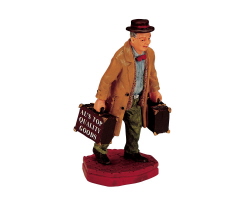 A small part of this post by Chris Brogan caught my eye and got me thinking.
A small part of this post by Chris Brogan caught my eye and got me thinking.
Here is what Brogan said that jumped out at me:
Last night, Kat and I were at Ruby Foos in Manhattan for dinner after a movie. The server, Jenna, was pretty good at her job, but when it came time to try and sell us dessert, I noticed a flaw in her service. She said, “Do you think you’re going to have room for dessert?”
The answer to this should always be no. To say yes is to say that you’re gluttonous. It also isn’t very appealing. It requires more questions.
Instead, if Jenna had said, “We make the most amazing molten chocolate cake here,” I might have raised an eyebrow. Even if chocolate isn’t my thing, my head would immediately go to the dessert I wanted, but then I’d already be shopping for it.
This is a great example of suggestive communication. It is also why in a sales environment words matter so very much. The slightest verbal misstep can mean a lost sale. Compounding this is the fact that each prospect has their own unique mix of triggers that will send them running for the hills.
I have limited experience in sales but my best pal, Chris Clark, is Director of Sales at Pivotal Payments. He is an accomplished sales exec and one of the most effective communicators I have encountered. I sent him Brogan’s post and asked him what he thought and whether he could cite a specific example of this approach. Here is his response:
Suggestive communication is key in a sales environment. Often times a strong statement that intones the answer to a question both parties know is coming is most effective. We train our people to endeavour to stay away from questions that can return a ‘no’ answer in their initial conversations of discovery with a prospect. It is far more effective to highlight the value of a product or service than to simply ask if the client is interested in it.
For example; ‘Are you interested in upgrading your system and saving money?’ is less effective than ‘By providing you with our next generation technology, we would both improve your existing infrastructure and lower your costs.’
I would also add that a key component to sales is relationship building, especially in our space – financial services. Generally, engaging a prospective client with language that is suggestive and communicates clearly is far more effective than asking open ended questions. By being more effusive, it allows the client to become more comfortable and also communicates the salesperson’s desire to service the prospect, thus allowing for a mutual trust and understanding to be built.
Chris’ answer is bang on. I can think of a number of occasions where good sales people have closed me using this technique. At the time I am not sure I even noticed that I was being closed. It just kinda happened, almost reflexively.
I tried to think of some other examples of these communications techniques applied properly to seal the deal:
“Are you interested in eating healthier and knowing where your food comes from?” could be “Organic, responsibly produced food is going to make your children feel better and give you the added assurance of knowing who produces your food.”
“Do you want to outsource event production and raise large sums of money?” could be “By using our expertise you will be able to get more from your existing in house assets and generate significant monies for groundbreaking research at your hospital.”
The takeaway from this discussion is simple: the way phrases are structured matters. Too often (and I am WAAAY guilty of this) we understand the goal and concept but fuck up the details of phraseology. PR, marketing and sales execs (and myriad folks from other functional areas) are well advised to periodically remind their people of the key communications snafus to avoid in their industry (whether those keys relate to how not to pitch a journo, how not to respond to a Twitter complaint etc). Better yet, mock up exercises and role playing scenarios are excellent ways to breed continued success and ensure skills stay sharp.
How does suggestive communication play in your industry? What communications missteps do you specifically need to avoid to win?
Very interesting & especially true. I really liked your idea of mock up & roll playing exercises to strengthen this skill set.